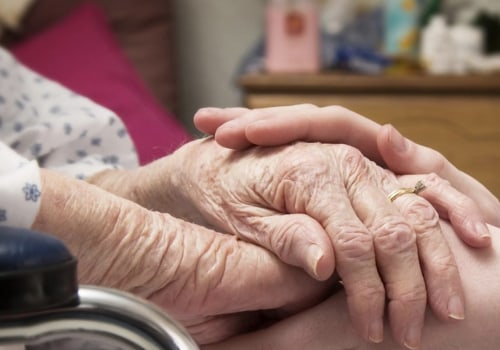Hospice care is provided by a team that works together and focuses on the patient's needs, whether physical, emotional or spiritual. The goal is to keep the patient as pain-free as possible, with loved ones nearby. Increasingly, people are choosing hospice care at the end of life. Hospice care focuses on the care, comfort, and quality of life of a person with a serious illness nearing the end of life.
The primary care physician is responsible for identifying the patient's need for hospice and making the referral for hospice services. The physician is encouraged to continue to participate as a member of the patient care team and to participate actively in the hospice care plan. The hospice medical director oversees patient care and support to the hospice team. The hospice medical director attends an interdisciplinary team (IDT) meeting to discuss the plan of care by helping to set goals and actively participate in decisions related to patient care.
The hospice social worker provides initial and ongoing psychosocial assessments of your loved one and establishes a psychosocial care plan. The social worker will typically see your loved one and family once or twice a month to provide emotional support and ensure that everyone's psychosocial needs are met. You, your loved one, any family member or a member of the IDT can request additional psychosocial visits as needed. The social worker can provide guidance to your loved one and yourself with topics such as assisting with a do-not-resuscitate (DNR) order, helping find financial or community resources, and, if necessary, arranging for placement in a nursing home or transferring to an inpatient care facility.
The hospice social worker can also provide counseling for you and your loved one during times of crisis. The hospice chaplain provides initial and ongoing spiritual assessments of your loved one and family, and provides interventions as needed. The chaplain visits once or twice a month or more often, as needed, if requested by you, your loved one or an IDT member. If relevant, the hospice chaplain coordinates care with your loved one's community spiritual care provider.
The care provided by the hospice chaplain is more spiritual than religious in nature. Spiritual care aims to address existential problems that are commonly experienced in the process of death. The care of the hospice chaplain is not denominational; proselytizing will never be attempted. The chaplain may, if requested by his loved one or his family, perform the funeral.
A hospice chaplain is a spiritual counselor and a bastion of comfort for hospice patients, caregivers, and families alike. Learn how hospice chaplains perform their role and what makes a hospice chaplain truly impactful. An important component of hospice treatment is palliative care, which focuses on the relief of pain and other symptoms of a serious illness. But the hospice team also addresses the patient's non-medical needs, such as managing the stress of end-of-life decision-making.
Hospice workers also help family members cope with death and death. Medical secretaries compile patients' health records and prepare reports to submit for regulatory purposes, such as demonstrating compliance with staff-related laws. They can also process insurance payments. The RN case manager (hospice nurse) is responsible for each patient.
This means that they will be responsible for designing the nursing care plan and oversees that continuity of patient care is followed. The volunteer coordinator is responsible for the recruitment, training and ongoing supervision of hospice volunteers. Makes the right placements for the many volunteer tasks. Hospice staff meet with the patient and family to discuss hospital services.
Evaluate the patient's medical condition, functional level, living situation, religious beliefs and social support system. Determine the long-term goals, desires, and expectations of the patient and family members. Hospice team works together to ensure all patient needs are met. We partner with primary care physicians and patient specialists to address their physical needs, keeping the physician informed about how their patient is progressing.
We work hand in hand with families, reuniting with them and their loved ones where they are to provide additional care designed to keep your loved one comfortable. Working together to care for the entire patient allows the hospice team to address your loved one's unique challenges and needs. If you or a family member is terminally ill and have exhausted all treatment options, you may want to consider hospice care. You and your caregivers are encouraged to contact your hospice team if you have any problems, at any time of the day or night.
Sometimes, the disease may stabilize or the patient's condition may show evidence of improvement during hospice care. The more the whole family understands what hospice teamwork can do, the more comfortable everyone will feel during the end-of-life process. Once the criteria for a terminal diagnosis are established and the patient and family consent to hospice care, a certification from two physicians must be signed certifying the terminal illness and the suitability of hospice. Hospice team members ensure that patients in their care are comfortable, pain-free and able to maintain the best possible quality of life.
If the primary care physician decides not to follow the patient in the hospice, the hospice medical director acts as the patient's primary care physician. When a patient lives beyond their prognosis, for example, families may lose sight of the fact that the illness is terminal and that it is the job of hospice workers to remind them. In addition, several occupations employed by palliative care providers are expected to add many jobs, grow rapidly and have many job vacancies. The hospice team is a group of specially trained health professionals who ensure that a hospice patient's last months, weeks, or days are lived in comfort and dignity.
While hospice is very supportive, the daily care of a person who dies at home is provided by family and friends. General information on hospice and palliative care, including data, data and professional resources on hospice, is available from the National Hospice and Palliative Care Organization and the U.S. Hospice Foundation. In addition to these building blocks, essentially all hospices benefit from the involvement of other support staff who make irreplaceable contributions to patient care and are vital to the survival of hospice organizations.
. .












